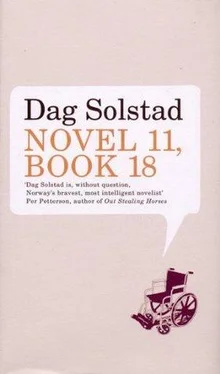The son returned much earlier than Bjørn Hansen expected. It was not even half-past seven when he let himself in. His father was sitting in the living room reading a book, The Concept of Dread by Søren Kierkegaard, and once again he could not help marvelling at the mind of this nineteenth-century Dane, who, by dealing with biblical myths in real earnest — as if, say, Adam and Eve had really lived, which, indeed, Søren Kierkegaard believed, that Bjørn Hansen had not the least reason to doubt — was able to breathe new life into some fundamental dogmatic concepts as old as the hills that had long been stone-dead for Bjørn Hansen. He perceived a presence and an intensity steam up from the book’s pages, taking hold of the mind of this godless tax collector in a Norwegian provincial town towards the end of the twentieth century. One hundred and fifty years of historical darkness and impenetrability had been pierced by a light, which reached this tax collector at Kongsberg — how strange! Though perhaps it was not to be wondered at, for, from a historical perspective, he had come down in the world, his profession having undergone a transformation, downgraded from government official to civil servant, the effect of which was that he could now think of the outsider and mocker of government officials Søren Kierkegaard as a secret ally, although in his daily life he had, of course, no sense of how his livelihood had deteriorated in the course of time, but it no doubt made him extra sensitive to the musicality of Søren Kierkegaard’s delving into such dogmatic and (to him) deadly true concepts. The edition he had was published in 1962, so he had first read the book when he was a young student. It was full of underlinings, which he now and then could not help smiling at, now and then being surprised by — gosh, had he really thought this sentence was so important that he had to underline it at the age of twenty-one, the same age Peter was now and with the same naked face — especially as he had read this book in his free time, con amore, not as part of his course, which was in economics, after all, where one was working with entirely different concepts and methods. But there was the click in the door and Peter coming home, just before the Daily News Round-up . Bjørn Hansen got up and turned on the TV. The son came into the living room and they sat together watching the Daily News Round-up . It was as though they were a sort of family, because that was how they sat, gathered around the daily news on TV, like thousands and thousands of families all over Norway. Bjørn Hansen and his adult son, whom he barely knew but who now sat there in his modern get-up, eager to enter upon the race of life, to take the first steps on the road that would bind him to an occupation, which he would stay in and live on for the rest of his life — this son of his, that is, who had taken the first steps on the road that was to turn him into a man, probably a paterfamilias when the time came, someone who for eight hours a day would sit bent over instruments designed to correct a weakened eye so that it could function like a normal one; a man, probably a paterfamilias, in a white smock bent over optical instruments and ground glass precisely adjusted to the concept of the perfect eye. Strange to sit like this, in a family idyll, with an almost totally unknown young stranger, but one he knew was his own son.
Peter, however, seemed little affected by the solemn partaking of this traditional daily family ritual with his father for the first time. He had returned to the flat with a bagful of books, papers, notebooks and binders, and had immediately gone to his room. He had then come back, sat down on the sofa to watch the Daily News Round-up for a moment, gone back to his room, come out again, sat down on the sofa and watched the Daily News Round-up to the end. He appeared excited, but also slightly restless.
When the Daily News Round-up was over, his father asked if he could turn off the TV. Peter nodded, it was OK with him. They sat in silence for a while, until the son suddenly said, ‘Algot hasn’t come.’ Bjørn Hansen asked who Algot was and received the reply that Algot was Peter’s friend and at the same time his good genius. He said the latter in a straightforward tone, causing his father to be taken aback, for he had never heard anyone describe a friend as his good genius before. Despite having made up his mind not to appear intrusive with his son, continually bombarding him with questions, he could not resist the temptation to do exactly that to find out as much as possible about Algot and his relationship to Peter.
Peter had met Algot in the military. They had been in the same platoon and lived in the same room throughout the service. They had become good friends. And it was Algot who had made Peter apply for admission to the optometry programme at the Kongsberg Engineering College. Before that, the idea would never have occurred to Peter, who barely knew what optics was. He had no idea what he would take up, but had considered a number of professions. He had considered computer science, media studies too, as possibilities. Actually, he had started a correspondence course in computer science; there were many good offers of correspondence courses in the military, and he had enrolled in computer science, like so many others. But Algot had said, ‘Computer science? There will be a surplus of people going in for computer science. In a few years, I think, we’ll see long queues of dissatisfied computer consultants, computer engineers and computer programmers in their early thirties in front of the retraining desk at the jobcentres. So forget it!’ Algot was going to study optics. That was not particularly surprising, for Algot was called Blom, and Algot Blom was the name of an optical firm in Oslo which had several shops in the capital and also planned to establish itself in other Norwegian cities. Naturally, Algot Blom was going to study optics, he was the heir to a veritable empire in that field. But he made Peter want to study optics too. The way he spoke about the profession made Peter interested in it. Because it had a great future ahead of it. It was not a profession only for someone whose father had an optician’s shop in his home town, far from it; in the coming years there would be an enormous need for people who had optics as their engineering speciality. That was the expression Algot had used. Optics as a speciality within the field of engineering. Anyway, he made Peter take a couple of correspondence courses which could be seen as an introduction to the study of optics. Dealing with optics in general. This was at the beginning of their military service. Algot had taken the same course, so they studied together, just the two of them, and since Algot already knew a lot about the subject it went like clockwork. And when Algot last spring had applied to be admitted to the optometry programme at Kongsberg Engineering College, starting in the autumn, Peter had done the same. It now seemed perfectly natural to him to seek admission to a field of study which, a few months ago, had not even entered his thoughts, with a view to making it his livelihood, for life. One might well remark upon the role played by chance in all this, but optics was a clever choice. That would soon become evident. Someone who chooses to obtain a degree in a small field with great future potential, but not altogether ‘in’, is wiser than someone who pounces on a subject of study that everyone is talking about, because it is always those who first see the potential of a subject and are bold enough to gamble on it who will enjoy the fruits of it once it has become ‘in’, and Peter had not the least doubt that optics would be ‘in’. Without being told straight out, his father understood that Peter had taken into consideration his friendship with Algot Blom when he chose his field of study. Not only had he selected a subject long before it would be extremely popular, but also he would, as a fully trained optician with a stream of new opticians behind him, benefit from his friendship with Algot. For there were more Algot Blom shops than Algot himself could manage. Therefore Peter often entertained the thought that, in a few years, he would manage a large optician’s shop in Oslo or be sent out to take over an optician’s in, for example, Kristiansand or Stavanger in Algot Blom’s name. It did not bother him in the least that this meant Algot would be his boss, because Algot was his friend. They had stuck together through thick and thin during their military service. Both inside the camp and in the town, on leave. What the two of them had experienced in town together could fill a whole novel, the son said, laughing. In particular, all those stories about how they had sneaked in without being seen, having stayed out beyond the time at which they were to report back to camp, would make people crack up with laughter if they were written down by a real author. Both had felt almost sad when they were discharged. But they were going to study together in the autumn, after all. He had heard from Algot in the summer. Then they had agreed to meet at Kongsberg today. They had not decided on a definite place or time; the town was not large, so they were bound to bump into each other, as Algot had said. But Peter had not found him. Not in the Engineering College. Not in the street. Not in any of the many pubs and restaurants where he had dropped in. He had the impression that the town was full of students, at least a thousand, who had inundated the streets and the pubs. But no Algot. He had been looking for him all day. Even at the Central Station in Oslo this morning, in case Algot had also taken the train, though he found this hard to believe as Algot was sure to have his own car. It was rather odd. After all, college would start tomorrow. ‘He will come at the very last moment, then,’ his father said. ‘There are many like that.’ — ‘But we had an agreement,’ Peter said, feeling wronged. — ‘Maybe he changed his mind,’ his father said. ‘Perhaps he thought he could benefit from a year of practice in one of the family businesses. Have you thought about that?’ — ‘But his name is on the list,’ Peter said obstinately. ‘I asked if he was there and they looked for his name and said that, yes, he’s there. So he’ll be coming.’
Читать дальше












